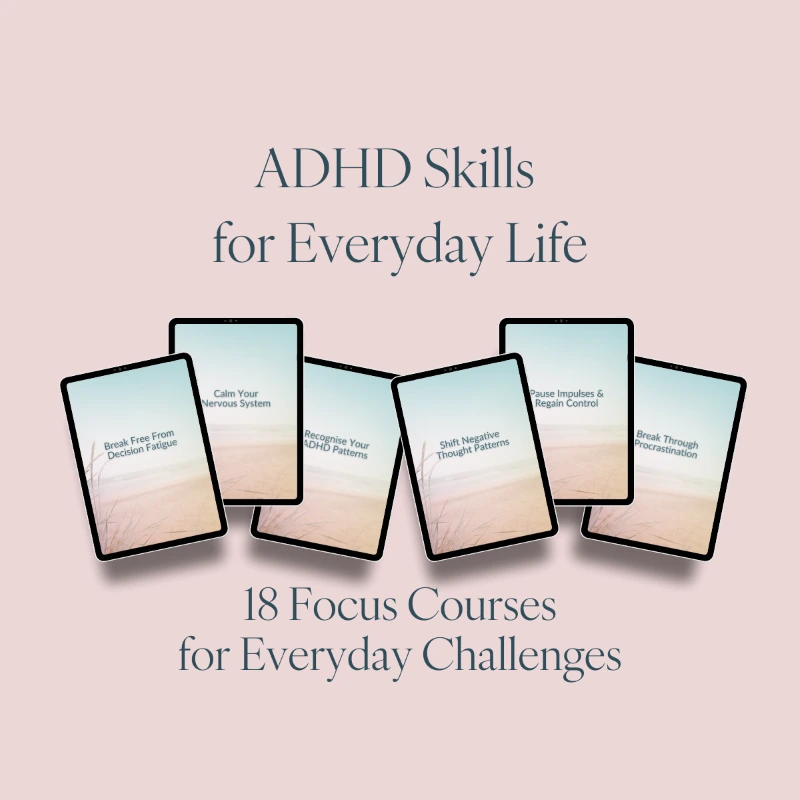Ever found yourself staring at a small task, an unread email, a pile of laundry, a form to fill in, and wondering why it feels like climbing a mountain? You know it isn’t complicated, but you just can’t seem to start. If that sounds familiar, you’re not alone.
If you’ve ever said something like that to yourself, or heard it from someone else, you’re not alone. One of the most frustrating parts of ADHD is how even the smallest tasks can feel impossible. Not because you’re lazy or disorganised, but because your brain is already running on empty
“It’s just an email.”
“It would only take five minutes.”
“Why can’t I just do it?”
I see this all the time in coaching sessions, smart, capable people who can handle complex projects, support families, and manage countless mental tabs at once, yet still feel completely stuck trying to reply to one message or book a dentist appointment.
It’s Not the Task, it’s Everything Around It
ADHD doesn’t just make tasks harder, it changes how your brain processes everything around them.
Here’s what might be happening:
-
-
Executive dysfunction: The brain’s ability to organise, prioritise, and start something doesn’t always activate. You know what needs to happen, but your brain can’t seem to bridge the gap between knowing and doing.
-
-
- Mental load: Your mind is juggling reminders, worries, and half-finished things, so even a “simple” task can tip the balance. It’s not that the task itself is complex, it’s that your brain is already full.
-
- Time blindness: You can’t tell if the task will take five minutes or fifty. That uncertainty makes it feel bigger than it is, so you delay it, and then feel guilty later.
-
- Perfectionism: You tell yourself you’ll do it when you have more time, more energy, or the “right” plan. But that moment never comes, so it stays on the list, adding quiet pressure each day.
-
- Rejection sensitivity: Even small tasks involving people, like replying to an email, can feel emotionally loaded. What if you say the wrong thing? What if it’s too late to respond? What if they think you’re unprofessional?
What It Can Feel Like
When simple things feel hard, it’s not just annoying, it’s emotionally draining. It can look like:
-
- Constantly putting things off (and then panicking at the last minute)
-
- Beating yourself up over small things
-
- Feeling like you’re always behind on “basic” life tasks
-
- Avoiding decisions because they feel heavier than they should
-
- Telling yourself, “Other people manage this. What’s wrong with me?”
And the worst part? You know the task isn’t challenging; that disconnect can feel like failure.
You’re Not Lazy. You’re Overloaded.
It’s easy to assume you’re the problem when everything feels difficult. But the truth is, your brain is navigating a world full of friction, and working much harder than most people realise.
You don’t need more willpower. You need less pressure, more compassion, and tools that fit the way your brain works.
What Helps (Without Adding Pressure)
Here are a few gentle, realistic things that can help:

Don’t aim to finish the task, just start. Open the tab, type one word, or set a five-minute timer. Often that’s enough to get momentum going.

A quick stretch, short walk, or grounding breath before trying again can help reset your state. I’ll soon be sharing short ADHD-friendly meditations designed to help calm your nervous system without taking up much time.

If you consistently ignore to-do lists, stop forcing them. Coaching can help you find planning systems that actually match your brain’s energy and focus patterns.

You booked the appointment, sent the email, or asked for help, that matters. Your brain needs to register those wins, not just the big ones that look impressive from the outside.

It’s Okay If the Basics Feel Hard
You’re not broken if you’ve been stuck on the same “easy” task for days. You’re not weak. You’re not lazy. You’re likely carrying too much without the right kind of support.
Understanding why simple tasks feel so hard is the first step toward changing the pattern.
Learning to lower the pressure, build small moments of success, and recognise your capacity is where real progress begins. And with practice, those small steps can add up to meaningful change, a calmer mind, lighter days, and more confidence in your own rhythm.
If this resonates with you, you might like to explore my ADHD self-guided courses for regulation strategies. They’re designed to help you understand your brain, reduce overwhelm, and take life one manageable step at a time.



